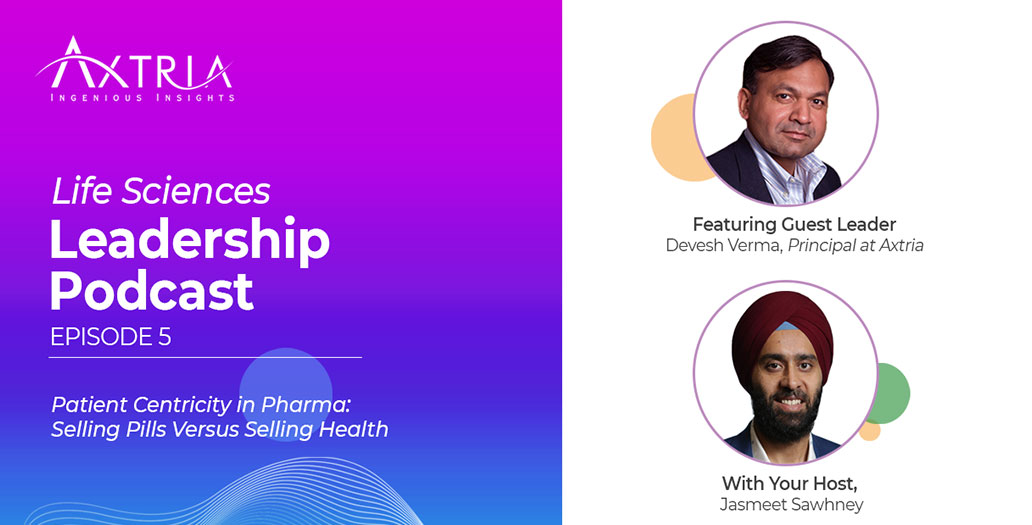
Episode 5: Patient Centricity in Pharma: Selling Pills Versus Selling Health
Pharmaceutical companies rely on meeting the needs of their patients. If there are no patients, then there would be no industry. However, the pharma industry has an interesting dynamic. The consumer of the product is different from the decision-maker of who is using the product. The patient is the consumer of the product, the prescriber will decide on the product, and the insurance company will pay for the product. Devesh Verma, Ph.D., joins the podcast to explain why the industry needs to focus on a patient-first culture. Companies should be willing to discover drugs that could improve patient health outcomes while actively involving and engaging patients in their treatment. Tune in as we discuss the challenges around patient centricity, how technology can play a positive role in the pharmaceutical industry, and why pharmaceutical companies should focus on selling health – not pills – to the most valuable customer in the pharma commercial model. In This Episode, We Cover:
- [01:14] Devesh’s introduction; overview about pharma’s customers.
- [06:01] Breaking down the patient-centric culture.
- [07:00] Challenges pharma companies face in becoming patient-centric.
- [08:36] How partnerships with technology companies can enable patient centricity.
- [14:48] How pharmaceutical executives can utilize technology to serve the needs of their patients better.
Key Takeaways:
- The life sciences industry needs to focus on selling health versus selling pills which requires innovative thinking and data.
- Investing in analytics and mining data from a real-time perspective is even more critical to understand patient needs and their preferences.
- Although regulatory frameworks will not change much, pharma can still engage with patients within regulatory boundaries to build deeper engagements.
- The industry’s future is contingent on how well it can change its perception, focus on patients, and impact their lives.
Meet Devesh Verma:
Devesh Verma, Ph.D., is a principal at Axtria, where he leads the marketing solutions practice. He has 20+ years of experience in brand marketing and planning, sales leadership, and management consulting. Before joining Axtria, Devesh led US brand marketing for a global pharmaceutical company’s key franchises. Devesh led a customer-centric transformation of the franchises by integrating traditional sales force channels with evolving digital channels. The customer-centric approach helped the franchises achieve the highest annual sales on record of over $3.3B.
Devesh’s experience also includes working at MarketRx, where he led many large engagements in marketing mix optimization, sales force size and structure, and call planning. Earlier, he has also worked at a major US airline and a leading technology firm.
Devesh received his Doctorate in Business Administration from the University of Minnesota. He received his Master’s in Aerospace Engineering from the University of Minnesota and Bachelor’s in Aerospace Engineering from the Indian Institute of Technology, Kharagpur.
Devesh on LinkedIn: https://www.linkedin.com/in/devesh-verma-ph-d-538622
Johnson & Johnson. Johnson & Johnson announces research study with Apple Watch to help improve AFib outcomes including stroke prevention" [press release]. Jan. 17, 2019 [cited Dec. 2020]. Available from: https://www.jnj.com/johnson-johnson-announces-research-study-with-apple-watch-to-help-improve-afib-outcomes-including-stroke-prevention
McCarthy, Justin. Big pharma sinks to the bottom of US industry rankings. [internet]. Sept. 3, 2019 [cited Dec. 2020]. Available from: https://news.gallup.com/poll/266060/big-pharma-sinks-bottom-industry-rankings.aspx
Ready to hear more from life sciences leaders? Click here to access our Axtria Insights resource library– your go-to for expert insights, industry perspectives, and modern business approaches.
Life Sciences Leadership Podcast - Season 1
The Life Sciences Leadership podcast delves deep into effective strategies, latest innovations, and trends in the life sciences industry. Join Axtria’s Jasmeet Sawhney as he sparks discussion with highly acclaimed life sciences leaders on various industry trends and topics that are critical to winning in the new environment. Whether you are transforming your R&D processes, working on commercial success strategy, or simply craving dynamic discussion, this is the podcast for you.



